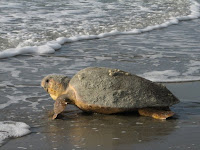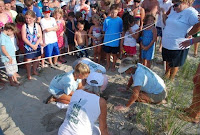That’s what it says on their T-shirts…..because that’s what they do. Who are they? The dedicated volunteers of S.C.U.T.E. The story below is taken from the DeBordieuScute. com website, currently under construction:Loggerhead sea turtles nest on South Carolina beaches May through October. S.C.U.T.E. which stands for South Carolina United Turtle Enthusiasts is one of 19 volunteer sea turtle protection projects along our coastline under the direction of the South Carolina Department of Natural Resources. The 60 mile S.C.U.T.E. area extends from North Inlet in Georgetown County to North Myrtle Beach. DeBordieu and Hobcaw beaches typically account for 40-50% of the nests in this area.
com website, currently under construction:Loggerhead sea turtles nest on South Carolina beaches May through October. S.C.U.T.E. which stands for South Carolina United Turtle Enthusiasts is one of 19 volunteer sea turtle protection projects along our coastline under the direction of the South Carolina Department of Natural Resources. The 60 mile S.C.U.T.E. area extends from North Inlet in Georgetown County to North Myrtle Beach. DeBordieu and Hobcaw beaches typically account for 40-50% of the nests in this area. 
Volunteers walk at sunrise during nesting season looking for the large turtle tracks leading from the ocean to the dunes and back. When tracks are found, volunteers use clues to determine the nest area. Pool cues are used to probe the sand and locate the egg chamber. An average nest of 120 ping pong size eggs may need to be moved if it is laid in an unsafe place such as below the spring tide line or in a high foot traffic area. Volunteers cover the nests with a plastic mesh to protect it from predators and erect a sign with the nesting date.
At about 50 days of incubation, volunteers begin to look for a depression in the nest indicating hatching activity beneath. When a nest hatches usually at about 55-60 days, hatchlin gs make a mad dash to the ocean following the fluorescence of the waves as long as they are not lead astray by onshore lighting. Three days later, volunteers conduct a nest inventory near sunset. A notice is posted at the kiosk at DeBordieu’s main pool at the Beach Club giving the time and location. At the inventory, a volunteer tells visitors about the procedure and printed information is handed out. The nest contents are dug out and data is recorded. Sometimes live hatchlings are found in the nest that weren’t able
gs make a mad dash to the ocean following the fluorescence of the waves as long as they are not lead astray by onshore lighting. Three days later, volunteers conduct a nest inventory near sunset. A notice is posted at the kiosk at DeBordieu’s main pool at the Beach Club giving the time and location. At the inventory, a volunteer tells visitors about the procedure and printed information is handed out. The nest contents are dug out and data is recorded. Sometimes live hatchlings are found in the nest that weren’t able  to emerge on their own. Volunteers put the hatchlings on the beach and let them crawl to the ocean and ‘imprint’. At maturity, 25-30 years, female loggerheads will return to the beach of their birth to nest.
to emerge on their own. Volunteers put the hatchlings on the beach and let them crawl to the ocean and ‘imprint’. At maturity, 25-30 years, female loggerheads will return to the beach of their birth to nest.
You can help loggerheads!
• Lights Out! Turn off oceanfront lights by 10 p.m. during nesting season. Lights can disorient adult turtles and hatchlings.
• Keep Our Beach Clean! Take your beach items home with you, fill in holes and leave the beach clean and clear at night for sea turtles.
• Avoid Disturbing Sea Turtles! If you see a sea turtle on the beach, crouch down and be still until she has started dropping her eggs. At that point you can move in closer, staying behind her and enjoy watching an age old wonder of nature!
 com website, currently under construction:Loggerhead sea turtles nest on South Carolina beaches May through October. S.C.U.T.E. which stands for South Carolina United Turtle Enthusiasts is one of 19 volunteer sea turtle protection projects along our coastline under the direction of the South Carolina Department of Natural Resources. The 60 mile S.C.U.T.E. area extends from North Inlet in Georgetown County to North Myrtle Beach. DeBordieu and Hobcaw beaches typically account for 40-50% of the nests in this area.
com website, currently under construction:Loggerhead sea turtles nest on South Carolina beaches May through October. S.C.U.T.E. which stands for South Carolina United Turtle Enthusiasts is one of 19 volunteer sea turtle protection projects along our coastline under the direction of the South Carolina Department of Natural Resources. The 60 mile S.C.U.T.E. area extends from North Inlet in Georgetown County to North Myrtle Beach. DeBordieu and Hobcaw beaches typically account for 40-50% of the nests in this area. 
Volunteers walk at sunrise during nesting season looking for the large turtle tracks leading from the ocean to the dunes and back. When tracks are found, volunteers use clues to determine the nest area. Pool cues are used to probe the sand and locate the egg chamber. An average nest of 120 ping pong size eggs may need to be moved if it is laid in an unsafe place such as below the spring tide line or in a high foot traffic area. Volunteers cover the nests with a plastic mesh to protect it from predators and erect a sign with the nesting date.
At about 50 days of incubation, volunteers begin to look for a depression in the nest indicating hatching activity beneath. When a nest hatches usually at about 55-60 days, hatchlin
 gs make a mad dash to the ocean following the fluorescence of the waves as long as they are not lead astray by onshore lighting. Three days later, volunteers conduct a nest inventory near sunset. A notice is posted at the kiosk at DeBordieu’s main pool at the Beach Club giving the time and location. At the inventory, a volunteer tells visitors about the procedure and printed information is handed out. The nest contents are dug out and data is recorded. Sometimes live hatchlings are found in the nest that weren’t able
gs make a mad dash to the ocean following the fluorescence of the waves as long as they are not lead astray by onshore lighting. Three days later, volunteers conduct a nest inventory near sunset. A notice is posted at the kiosk at DeBordieu’s main pool at the Beach Club giving the time and location. At the inventory, a volunteer tells visitors about the procedure and printed information is handed out. The nest contents are dug out and data is recorded. Sometimes live hatchlings are found in the nest that weren’t able  to emerge on their own. Volunteers put the hatchlings on the beach and let them crawl to the ocean and ‘imprint’. At maturity, 25-30 years, female loggerheads will return to the beach of their birth to nest.
to emerge on their own. Volunteers put the hatchlings on the beach and let them crawl to the ocean and ‘imprint’. At maturity, 25-30 years, female loggerheads will return to the beach of their birth to nest.You can help loggerheads!
• Lights Out! Turn off oceanfront lights by 10 p.m. during nesting season. Lights can disorient adult turtles and hatchlings.
• Keep Our Beach Clean! Take your beach items home with you, fill in holes and leave the beach clean and clear at night for sea turtles.

• Avoid Disturbing Sea Turtles! If you see a sea turtle on the beach, crouch down and be still until she has started dropping her eggs. At that point you can move in closer, staying behind her and enjoy watching an age old wonder of nature!
For more information on S.C.U.T.E., or to find out when the next DeBordieu turtle inventory is taking place, give me a call or email.

According to Jeff McClary of S.C.U.T.E., “there is an Inventory tonight @ 6 in the Prince George section of Debordieu Beach. The nest is located near the “Mermaid Windmill”, just about the center of the Beachfront houses.” Thanks Jeff!